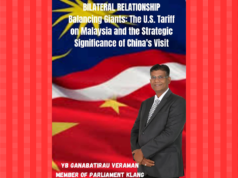MOSCOW: Chinese leader Xi Jinping emphasized the importance of relations with Russia as a counterweight to US influence by visiting Moscow on his first foreign trip as president, and secured more oil to fuel China’s growing economy.
Although relations between Moscow and Beijing have rarely been smooth, they have improved in the past decade and Xi highlighted this by signing energy, trade and political deals yesterday to strengthen ties between them.
Russian President Vladimir Putin has long sought to blunt US influence overseas, while China is grappling with the expanded military and economic interest the United States has displayed in Asia since 2011.
Xi became the first foreign guest to be met in the Kremlin by an honorary cavalry escort created by Putin in 2002, officials said, and looked at ease with the Russian leader in its glittering halls despite the formality of the occasion.
Putin, 60, greeted Xi with a firm handshake and a grin then ushered him down a red carpet past a long line of officials and into the Kremlin’s gilded Green Room.
The meeting was carefully scripted and any disharmony was glossed over. But Putin looked more comfortable with Xi than with the French and German leaders, Francois Hollande and Angela Merkel, who raised human rights concerns during recent visits.
“I get the impression that you and I always treat each other with an open soul, our characters are alike. We always speak in a good manner, you and I are good friends,” Xi, 59, told Putin as they began their talks, sitting in gold-trimmed chairs.
 His remark recalled former US President George Bush’s declaration on meeting Putin in 2001 that he had looked him in the eye and “was able to get a sense of his soul”.
His remark recalled former US President George Bush’s declaration on meeting Putin in 2001 that he had looked him in the eye and “was able to get a sense of his soul”.
The crowning point of the visit was an agreement between Russia’s biggest oil producer, Rosneft, to gradually increase oil supplies to China to 45-50 million tonnes a year – three times the current level.
Rosneft, meanwhile, will be granted a US$2 billion loan from the China Development Bank and a $2 billion deal was announced by Russian and Chinese companies to develop coal resources in eastern Siberia.
But they did not agree on a long-sought deal on supplies of pipeline gas to China, underlining the lingering mistrust that has dogged relations for decades.
Even so, Putin declared the visit a success.
“The new Chinese leader’s decision to choose our country on his first foreign visit highlights the special nature of the strategic partnership between Russia and China,” he said.
New president, new impulse
Xi arrived in Moscow with first lady Peng Liyuan, a singer whose first step into the international limelight was an instant Internet sensation in China, where her glamorous appearance won her an immediate fan club.
There was no sign, however, of Putin’s estranged wife, Lyudmila. She was last seen at a state event last May, when Putin was inaugurated for a six-year third term.
Putin has said he wants to “catch the Chinese wind in our economic sail”. China’s economy is the world’s second largest and could outstrip the US economy during Xi’s 10-year term.
Mutual trade has more than doubled in five years to hit US$87.5 billion in 2012. But the trade volume is still about five times smaller than Russia’s with the European Union and far smaller than China’s trade with the United States.
Relations between Russia and China were often uneasy during the Soviet era even though Moscow was also then under communist rule. But the two UN Security Council members’ solidarity on important global issues has strengthened in recent years.
“China and Russia have similar or identical positions on key international and regional issues,” Xi said, reading from a statement after talks and a document-signing ceremony, with Putin sitting beside him behind a large white desk.
“We intend to still more decisively defend the aims and principles of the UN Charter and the commonly accepted norms of international relations, to protect justice and equality in the world and provide for peace, stability and prosperity.”
The two countries have three times blocked Western-backed measures on the conflict in Syria despite talk of grumbling in Beijing, and Russia has followed China’s lead on North Korea. They gave no details of their plans for reinforced cooperation and reporters were not allowed to put questions to them.









